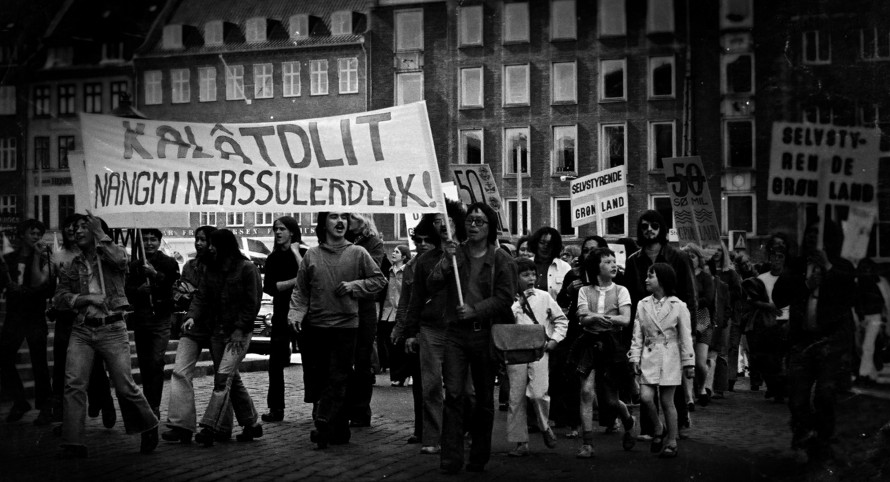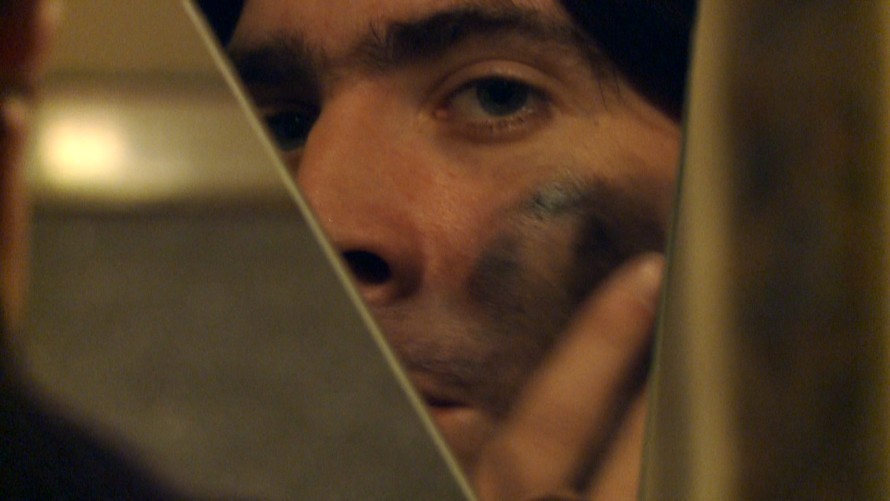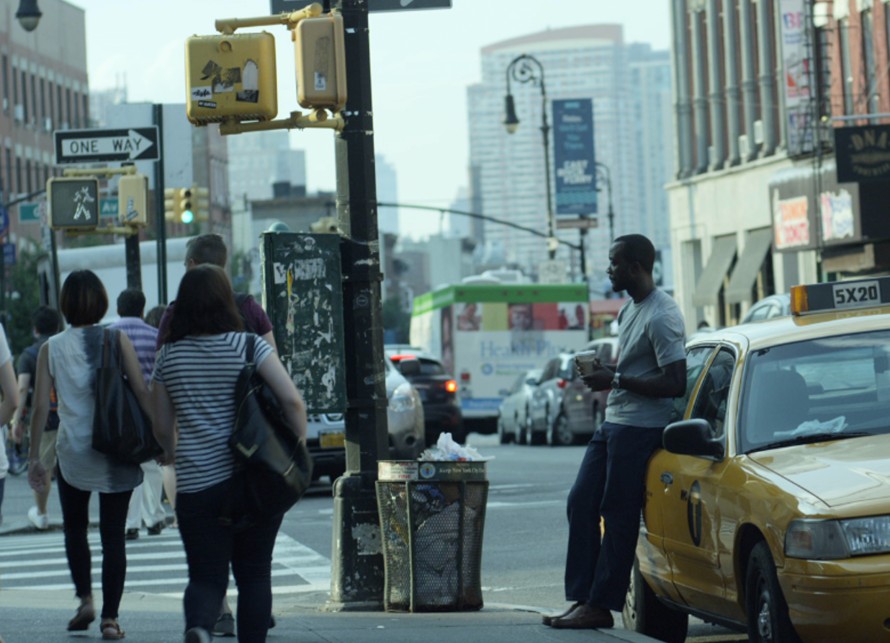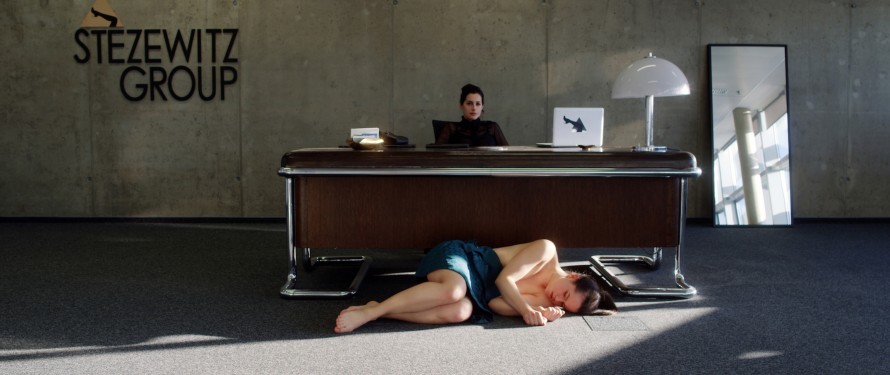2015 | Panorama
Increased Risk-Taking
More combative than ever, Panorama curator Wieland Speck discusses the programme 2015 and delineates a clear political agenda. In the interview, he speaks about abuse, national traumas and the allure of the uncommercial.

Sume - Mumisitsinerup Nipaa (Sumé - The Sound of a Revolution) by Inuk Silis Høegh
This year one topic is really on your mind, isn't it?
Yes, the topic of abuse with which you can't really get to grips. You'd have to remove the taboos surrounding this topic to implement effective prevention – just as it used to be with AIDS. And this is exactly the place where we can really contribute something with some films, in this year's programme more than I’ve ever seen before. And also be more willing to take risks.
Which films deal with this topic?
For example, Chorus by François Delisle: the abuse does not actually feature in the film itself, but instead comes from the sound recording of a prisoner being interrogated. Eight years after the disappearance of their son, a couple is confronted with the boy's death when the tape of the interrogation is played back to them. The perpetrator gives an account of everything he did to their child and it is almost unbearable. The film's main subject matter is actually the parents' grieving process. But the abuse is nevertheless what triggers their condition. Which is also the case in Rosa von Praunheim's Härte (Tough Love), which tells the story of karate world champion Andreas Marquart who was badly beaten by his father as a child and sexually abused by his mother. This destroyed his self-confidence. Such actions create a situation where a person can become highly emotionally withdrawn and resort to violence.

Danielův Svět (Daniel’s World) by Veronika Lišková
One film which I find very special in this context is Danielův Svět (Daniel's World) by Veronika Lišková...
That is a very important film on this topic. It's the first time I've ever seen a film which deliberates on how abuse can be prevented. Danielův Svět (Daniel’s World) undoubtedly leaps over a taboo because a young man reveals himself to be a paedophile, something which all of us can immediately sense is terribly dangerous. You also sense that this is a film you'd really rather not see, because hardly anyone wants to deal with this subject matter. It's an untouchable taboo. It is forbidden to come to terms with it, as we have seen with the Edathy affair. Yet there are billions of these images on the internet. The press hardly ever tackles the abuse of girls, although we know statistically that one in three girls is groped at sometime – so the abuse of billions is a daily occurrence. This taboo must be met head on. Otherwise we're just bothering ourselves with crimes which have already happened. We must shut the stable door before the horse has bolted. You can't approach this topic via democracy. It's obvious we have to approach it via culture and not just short term politics.
I can vaguely recall a few earlier films which dealt with abuse, for example The Woodsman by Nicole Kassell...
Yes, such films crop up from time to time but they are so dishonest, they film around the problems – and that made me really angry. This year there's a willingness to take risks that is much greater than before. For the first time, there are several films on this topic which take very different approaches – instead of just one film every four or five years. And secondly, they get much closer to the topic. Films have seldom got so close as Rosa von Praunheim's work or Danielův Svět. The latter actually shows the attempt to make something public about which the public really don't want to know. That's really the most interesting aspect. The public must know so that something can change because at the moment the situation is unacceptable. And at the same time, everyone is sticking their heads in the sand. I also wondered if I could avoid the film because it is honestly something you don’t really want to touch.

Jun Zhong Le Yuan (Paradise in Service) by Doze Niu Chen-Zer
National Traumas
The topic of traumas connects individual stories with the bigger HISTORY and with the questions of how it is written and told. Is this a second major focus of the 2015 programme?
Gukje Shijang (Ode to My Father) by J K Youn looks back at the foundations of the economic miracle that is South Korea and they are actually traumatic and originate from a very terrible situation. The Americans withdrew, families were split up. It led to the first big wave of guest-workers in Germany, long before the Italians, Greeks and Turks. In Germany, it is about the conditions in the mines and the hospitals where the Koreans were employed who, with their wages, helped Korea's economy to jump start. But the trauma of the division of the country remained. Something which very much mirrors Germany after the Second World War. This whole hostility towards neighbours, which is obviously installed in people and then is morally castigated as xenophobia. It’s basically always about the neighbours. And these conditions, which exist today in eastern Germany, where there are hardly any Turks but Turks are nevertheless violently hated – this represents a level of abstraction which is pure ideology and has nothing to do with actual experience. You reach these conclusions when you look into history. It always follows the same mechanisms: the demarcation of the individual from the rest of the world, then the tribe from the rest of the world, then the country from the rest of the world. Demarcation and profiling always play a role in both personal history and the bigger scale history of a nation.
Jun Zhong Le Yuan (Paradise in Service) tackles a topic where the director Doze Niu Chen-Zer really falls between all the stools, yet the film is an important taboo-breaker: it shows how the military forced women into prostitution for their soldiers, an event which blocks relations between Korea and Japan to this day, and which the Japanese still refuse to acknowledge. In Europe it would be unthinkable to take such an approach to history. The film is being watched with great interest in Taiwan because it contains many Taiwanese connotations which we cannot recognise in Europe. We can, however, read the big connotations.

Cobain: Montage of Heck by Brett Morgen
This year you have a lot of films in the programme which contain original documents. The two music documentaries Cobain: Montage of Heck and What Happened, Miss Simone? as well as the documentary Une Jeunesse Allemande, to mention just three. How do the films handle these documents and what are the similarities and differences in their approaches?
Both music documentaries come from the USA and follow an Anglo-Saxon approach. Which means principally archive material intercut with specialist "talking heads". This isn’t normally our preferred format but it nevertheless works in these films.
Une Jeunesse Allemande (A German Youth) by Jean-Gabriel Périot is exclusively constructed from archive material – without any commentary. It begins with the Red Army Faction terrorists as absolute bearers of hope, as creative political and journalistic forces. We witness the slow radicalisation from important, innovative, courageous, intelligent, politically imaginative people into terrorists. Périot leads us through the dffb where Holger Meins studied film. Alongside him are Harun Farocki and Hartmut Bitomsky who didn’t become terrorists but who were also part of the first intake of the film school which is now based in the Sony Center Filmhaus and thus resides at the heart of the Berlinale.
Je suis Annemarie Schwarzenbach (My Name is Annemarie Schwarzenbach) is an approach to the novelist and the image of a character. She is not only fascinating because of her written work but also because of the way she looked. Because of what you feel when you see her. The handful of black and white photos, above all from Berlin photographer Marianne Breslauer, have given her an eternal life. She is an androgynous figure, one of those typical inspirations which were transported from the 1920s to the 1970s. Aesthetic and political. Annemarie Schwarzenbach was one of the modern Europeans of the 1920s, a friend of Erika Mann. And now French filmmakers invite young people to discover Annemarie Schwarzenbach in themselves. Nine women and a boy who embody this character, this image.

Censored Voices by Mor Loushy
Censored Voices by Mor Loushy is an Israeli documentary which looks back into history to pinpoint what a country was like at a particular point in time in order to understand where it has ended up today. Israel is naturally an extremely fascinating case because the country has never found a functioning form. Loushy's film confronts the old soldiers of today with their younger voices and the statements they made directly after returning victorious from the Six Day War which gave a huge boost to the sense of a national identity in their country.
To return to Une Jeunesse Allemand, does the viewer learn something in it about the internal discourses of society at the time?
Yes, absolutely. It is about becoming a terrorist. Usually such films tackle how society deals with the '"problem", with the fact that something terrible has happened. In Une Jeunesse Allemande the focus lies on the era itself which allowed this kind of terrorism to develop – without pointing the finger. I am part of that generation and its sympathising zeitgeist. We felt the anarchist force without actually saying "I’m alright with murder."
Does it make a difference that it is a French person addressing this era?
Absolutely, because when Germans talk about this period you can sense a strong obligation to position themselves. And this obstructs an "epic view" of events. You must be able to analyse as a free thinking person and relatively clear of taboos – that doesn't work with people who are within the daily grind and conform to hidden agendas.

Out of My Hand by Takeshi Fukunaga
I find Takeshi Fukunaga's Out of My Hand very interesting in this regard: he is a director who was born in Japan, now lives in the USA and in his film he fights his way from Liberia back into the country where he currently lives...
I saw a very incomplete cut some time back, had no idea what it might turn into, but nevertheless immediately thought: I must follow this. In the finished film you learn a lot about Liberia without the background of the civil war being made explicit. But you can sense its presence. The workers move within Mafia-like structures, they are badly paid, there are strikes and arguments with their wives – because when you go on strike you don't get paid. The social community of the village has disappeared, society is now formed of small families which makes it incredibly easy to control people. The lead character emigrates to New York. As he begins to find his feet he is recognised by someone from the small Liberian community there which brings back the trauma of the civil war. The good character changes in the last quarter of the film. It's all rather acerbic. I was very impressed by the film.
So there are exiles who are forced to flee. But the programme also features those who want to leave, who are looking for the kick from an entirely different position. Perhaps in Peter Kern's Der letzte Sommer der Reichen (The Last Summer of the Rich) and in Haftanlage 4614 (Prison System 4614) by Jan Soldat about prison as a fetish, which I couldn’t believe really is a documentary...
It's crazy, isn't it? I don't think you can really pin it down. Which brings us back to taboos and the shaping of character. Everything is fine there because no one is seriously harmed, but the same conditions with the same borders of perversion would of course be illegal if compulsion or minors were involved. It makes you ask: where does this come from? And: can these people be helped?

Der Letzte Sommer der Reichen (The Last Summer of the Rich) von Peter Kern
Der letzte Sommer der Reichen also contains a spiral of perversion in which global citizen Lady Stezewitz becomes entangled as, being an heir to an aristocrat's millions and of a Jewish background, she awaits the death of her hated Nazi grandfather only to then begin a relationship with his female carer. She clearly has many skeletons in her closet, as is made obvious by an abusive situation: she tortures a girl, probably just on purely racial grounds. '"Opulent, elegant, a cream-cake with bondage straps" were my personal notes on the film. It breaks an entire panoply of taboos.
With Sume - Mumisitsinerup Nipaa (Sumé - The Sound of a Revolution) you are showing the first ever Greenlandic film at the Berlinale.
Yay! We have waited a long time but it has paid off. Sumé are the Ton Steine Scherben (influential leftist German-language rock band from the 1970s) of Greenland. The film depicts the revolution of the 1970s when the Greenlandic language was rediscovered and people rebelled against Danish colonialism. Sumé provided the soundtrack to these demonstrations – exactly like Ton Steine Scherben on Berlin’s Mariannenplatz in 1972.

Blixa Bargeld in B-Movie: Lust & Sound in West-Berlin by Jörg A. Hoppe, Klaus Maeck and Heiko Lange
Moments not to be commercialised
Speaking of Berlin: with B-Movie: Lust & Sound in West Berlin you are showing one of the most exciting chapters in the city's history, the 1980s...
As far as culture is concerned, I count the decades from mid-decade to mid-decade, so I locate the 1970s as being from 1975 to 1985. That's the era when Berlin had this extremely liberated creativity. When you mention the 1980s, it automatically carries the connotation of a commercialised time, though the creative perspective – when it really was sexy – only covers the first half of the 1980s and that is the period shown in B-Movie. It's comparable to the 1920s, when an image was also created from which Berlin profited for decades because it linked the city to excitement and promises of happiness. Those were moments which gave rise to so much and which could not be commercialised. The stars of this time never became commercial stars and yet we know of them even to this day.
Today, this exciting metropolitan atmosphere is relevant again, at least from a marketing perspective...
Today it's all talk, back then it actually existed. When capitalism fails to grow, it flogs the same thing for the third time in a different bag. Legends in shopping bags – that is our time, sadly. We will also certainly invent something, but we don't know yet what it might be. And when we have invented something, then it will quickly become a commodity and that destroys the charm of the invention. We have destroyed a lot of great ideas over the past few years in this way. Because this greed and the realisation that everything can be made into a money-making machine leaves almost no room for inventors. On the other hand, today’s inventors are so commercially educated that everyone wants to make it.
"Start-up" is the magic word!
Exactly. And crowd funding and all that bollocks!